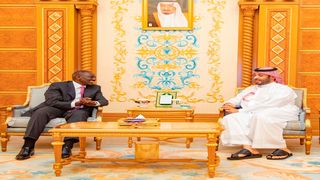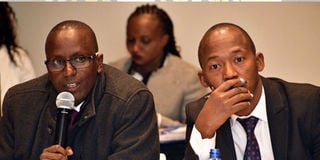
President William Ruto with the Crown Prince of Saudi Arabia Mohammed bin Salman at the King Abdul Aziz International Conference Centre in Riyadh in October, 2023.
| Courtesy | PCSNews
Premium
Revealed: Saudi Arabia’s ‘secret prize’ in climate loans to Kenya
What you need to know:
- Kenya recently developed cordial relations with Saudi Arabia with President Ruto visiting Riyadh at least thrice since he came to power last year.
Saudi Arabia is the second largest producer of crude oil after the United States, with the Middle East nation exporting more than half of its oil.
Kenya is one of the African countries selected by the government of Saudi Arabia in an ambitious plan by the oil-rich nation to reverse progress on fossil fuel divestment by funding high-carbon infrastructure across the continent.
An undercover investigation by journalists from the Centre for Climate for Reporting (CCR) reveals that Kenya is one of 19 countries in Africa identified by the Gulf nation for its Oil Sustainability Programme (OSP).
The OSP, the investigation revealed, is a climate change ploy whose real aim is to keep selected countries in Africa and Asia dependent on Saudi oil.
Through the OSP the Gulf State, flush with billions in its Sovereign Wealth Fund , plans to help build airports, roads and ports and whose airplanes, cars and ships respectively will be powered by Saudi oil.
The investigation revealed that the Saudi government is in talks with an undisclosed car-maker who is expected to develop cheap but high-fuel consuming cars that will then be deployed to the selected countries.
It is a state-capture like scheme favoured by China, which has been able to extract critical oil and minerals from Africa and Asia to power its industries.

President William Ruto assured Kenyans that his government has put in place measures to stabilise fuel prices and ensure that they are further reduced in the coming months.
Kenya, which has recently developed cordial relations with Saudi Arabia with President William Ruto visiting Riyadh at least thrice since he came to power last year, has been identified by OSP as one of the countries with the potential for both Liquefied Petroleum Gas (LPG) and solar energy projects, according to a presentation given to the African Refiners & Distributors Association, a member-only club, in Cape Town, South Africa, by the head of OSP Mohammad Al Tayar.
The CCR journalists have since shared this presentation with the Nation.
The documents, together with others that were not shared in Cape Town, were obtained from the Saudi officials by the undercover journalists posing as investors keen to invest in the 46 projects being sponsored by the Kingdom of Saudi Arabia.
During the call, the Saudi officials revealed they will not only be pushing for deployment of internal combustion engines cars, which are powered by burning petrol or diesel, but they also made it clear that they were unenthusiastic of electric vehicles.
Saudi Arabia is the second largest producer of crude oil after the United States, with the Middle East nation exporting more than half of its oil.
Although Kenya is not one of the African countries where implementation of OSP’s ‘green’ projects has already been announced and kicked off, it has had interactions with Saudi Arabia that fit well with the East African nation’s choice as a potential launchpad for clean cooking energy.
Early last year, Kenya received $13.79 million (Sh2.14 billion) from 16 Saudi firms, including Saudi Aramco, the world’s largest oil producer and Saudi Electricity, at an auction organised by Saudi Arabia’s Regional Voluntary Carbon Market Company (RVCMC).
“A portion of proceeds from these credits have been invested towards funding clean cooking and solar home systems,” said President Ruto during the launch of the African Carbon Market Initiative at COP27 last year.
Carbon credits allow companies to emit a specific amount of carbon dioxide or other harmful gases — with one credit being the equivalent of a tonne of emissions. These credits are known to be generated through projects such as tree planting or using cleaner cooking fuel.
The damning revelations come days to the start of the United Nations Climate Change Conference or Conference of the Parties of the United Nations Framework Convention on Climate Change (UNFCCC), commonly known as COP28 in Dubai.

The National Assembly Departmental Committee on Energy Vice Chairperson Lemanken Aramat (left) with Chairperson Vincent Musyoka. The committee plans to visit Russia and Saudi Arabia in effort to get to the bottom of the Sh17 billion fuel saga.
The 21st session of the COP (COP21) led to what is popularly known as the Paris Agreement, in which countries agreed to limit global temperature increase to 1.5C above pre-Industrial Revolution levels by 2100, and to act to adapt to the already existing effects of climate change.
Scientists agree that human activities such as transport have been largely responsible for global warming. Most cars, aircraft, trains and ships that transport people and goods run on fossil fuels, including diesel and petrol, which when burnt emit greenhouse gases such as carbon dioxide and methane.
By absorbing the sun’s heat that radiates from the Earth’s surface, trapping it in the atmosphere and preventing it from escaping into space, these greenhouse gases have been blamed for the record increase in global temperatures.
The increased temperatures have in turn resulted in climate change which has manifested through such natural disasters as prolonged droughts and flooding.
Saudi Arabia, led by its Crown Prince Mohammed bin Salman, the Kingdom’s de facto ruler, has publicly sold the OSP as the Gulf state’s scheme to help reduce emissions of greenhouse gases to 1.5 degrees Celsius.
However, the undercover reporters from the Centre for Climate Reporting, discovered that privately Riyadh is using OSP to help boost the consumption of its oil by driving a major increase in petrol and diesel-fuelled vehicles and boost fuel sales through increased air travel.
The plan is to use these two projects to establish a relationship that would see Riyadh, using its sovereign wealth fund and diplomatic influence, channel multibillion-dollar investments into ports, airports and roads across Asia and Africa while ensuring that majority of the cars, ships and aeroplanes are powered by Saudi oil rather than not clean energy.
Asked by the undercover official if the plan was to designed to artificially stimulate demand in emerging markets in order to offset a decline in demand due to efforts to tackle climate change, one Saudi official, Nawaf Al-Fallaji, responded, “Yes… it’s one of the main objectives we are trying to accomplish.”
“In the case of roads, we aim to accelerate and enhance the impact and adoption of internal combustion engine technology,” said Saleh Aldayel, one of the OSP officials on the call.

Kenya Ports Authority Managing Director William Ruto (left) shows journalists what he claimed was a fake bill of lading on November 13, 2023 as he refuted claims made by businesswoman Anne Njoroge linking the agency to the 100, 000 metric tonnes of ‘imported’ diesel loaded on vessel Haigui. Looking on is KPA Board Chairman Benjamin Tayari.
“We are actually conducting some studies to understand the psychological behavior, the infrastructure readiness of these countries, what type of cars are possible to be deployed there and even the financial capabilities of different countries,” said Aldayel.
This even as they made it clear that they saw the spread of electric vehicles (EVs) as a threat.
“You know the situation that EVs are being favoured in terms of subsidies and regulatory advantage irrespective of the actual economic and environmental competitiveness, “said Aldeya.
“What we are working on is to support, to increase internal combustion engine adoptions… promoted through fair policies by working with regulators and industry leaders,” said Aldeya.
Towards the end of last year Saudi Aramco got the nod from the competition watchdog to enter the Kenyan market through the acquisition of US motor oil and lubricants group Valvoline which has a presence locally.
Aramco is also one of the firms that are supplying fuel to Kenya under the government-to-government import credit scheme aimed at addressing exchange rate volatility.
Other companies include United Arab Emirates’ Abu Dhabi National Oil Company (ADNOC) and Emirates National Oil Company.





